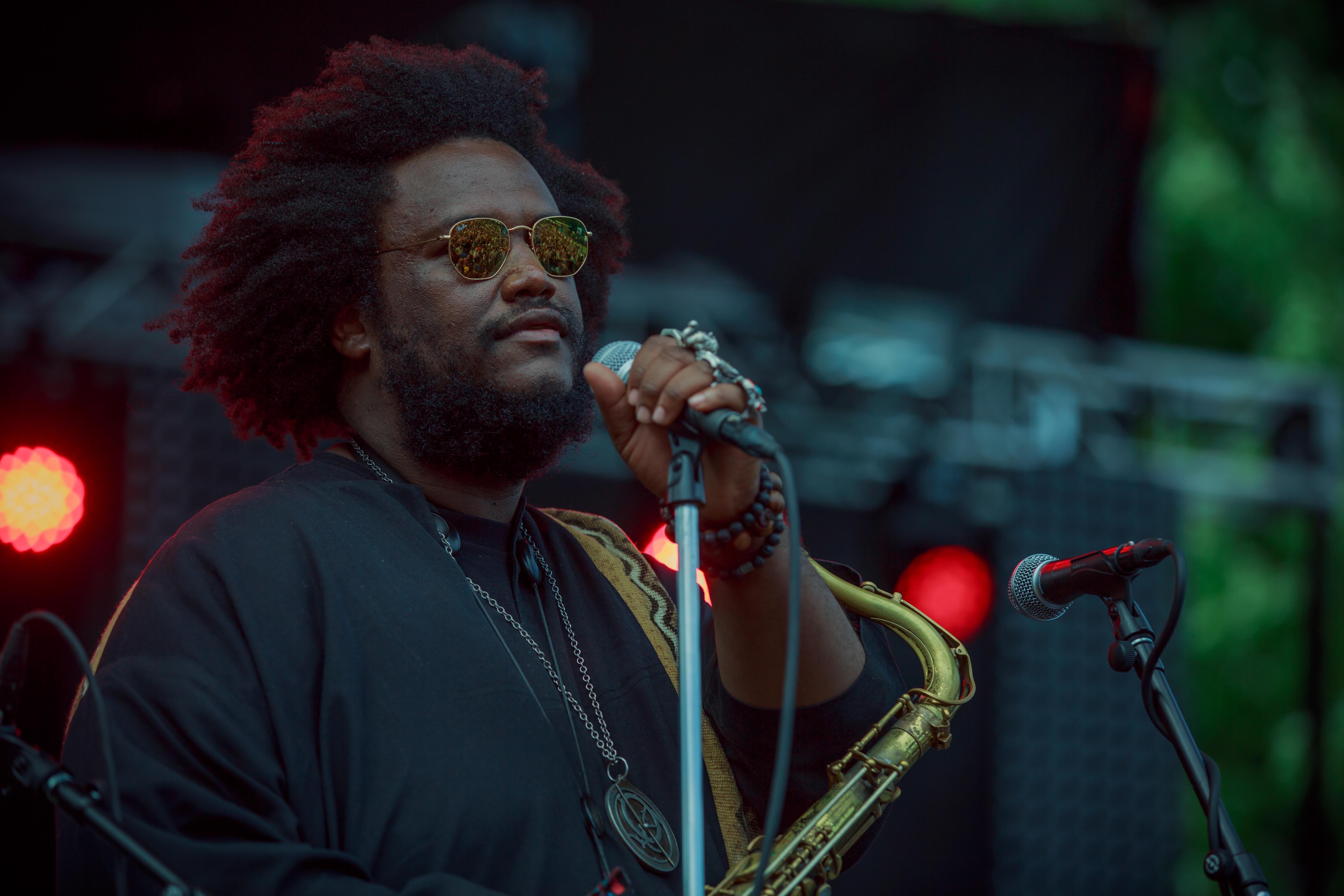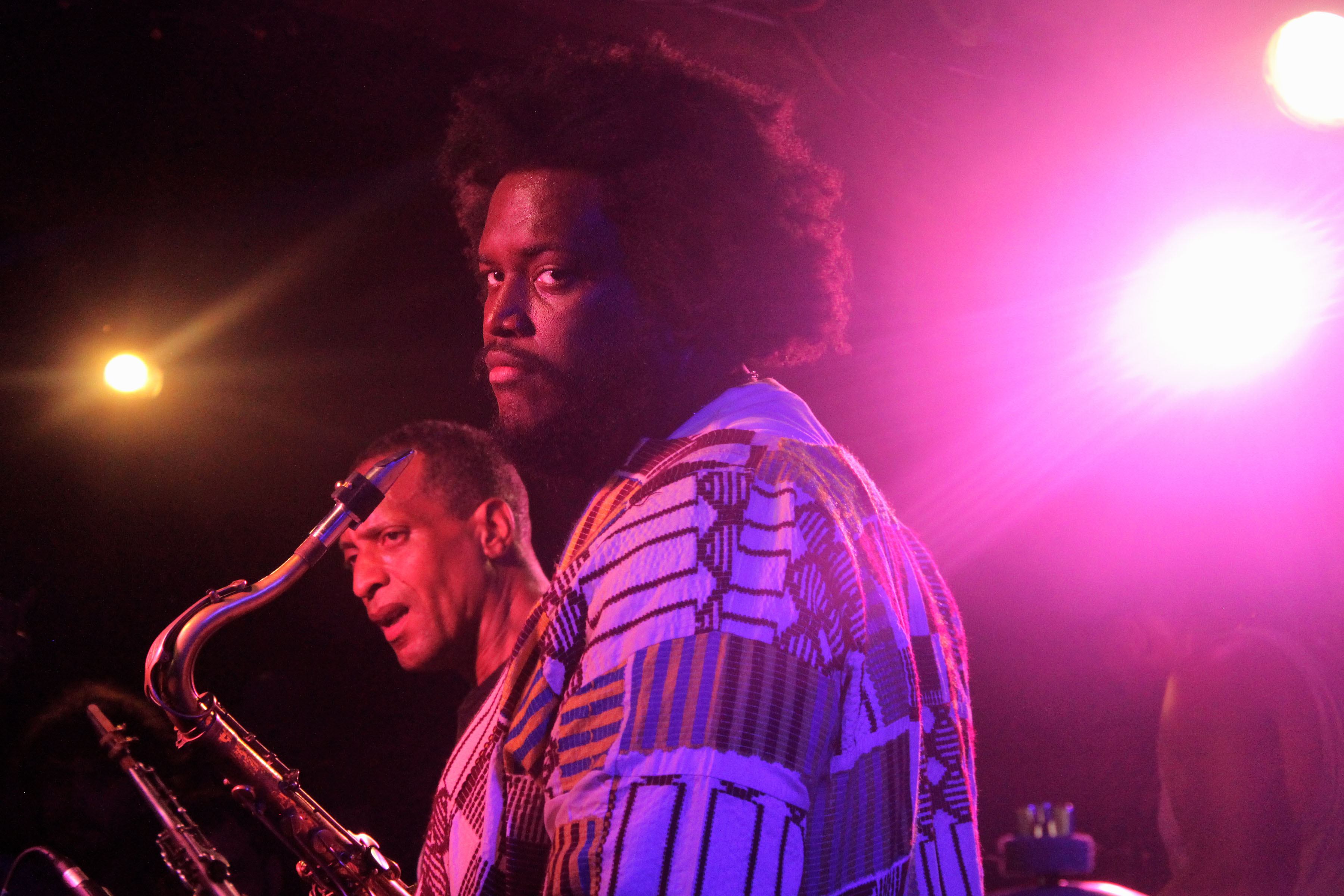From the moment Kendrick Lamar dropped To Pimp a Butterfly in 2015, America began to take notice of jazz saxophonist Kamasi Washington. He was but one of dozens of collaborators on the album that would eventually win pretty much every award under the sun, but his presence—an urgent momentum that propelled To Pimp a Butterfly through songs and interludes toward climactic resolution—was felt throughout.
By the time the Angeleno released his 172-minute triple album a few months later—appropriately titled The Epic—he was well on his way to becoming a national jazz superstar, recognizable not only in that genre’s circles but far wider. The Epic would go on to be a highly lauded album in its own right; in March, Washington was given the first-ever American Music Prize, which is awarded to the strongest debut record by an American artist.
Washington and his band have already begun work on a follow-up record, with hundreds of songs written and some demos recorded. Their performance at Outside Lands in August was one of the final few before a planned September break.
Sitting backstage at the San Francisco festival and twirling a heavy, intricately carved cane with a lunging shark near its handle, the thirty-five-year-old explained how he and his band’s successes have validated the mentality that’s guided them since high school: respect the greats but be true to yourself. When others, often meaning well, told him and his friends-turned-bandmates that they needed to conform to jazz conventions to turn talent into success, they plowed on. Washington has known all of his bandmates since childhood and some since he wore diapers. As they fell in love with jazz and grew closer, the band, now called The Next Step, formed itself.
“I don’t know if I selected it,” he says of the group’s roster. “It’s like The Wizard of Oz. ‘I’m headed to see the Wizard. You wanna go?,’ And they’re like, ‘Shoot. That’s where I wanna go, too. Let’s go!’”
For many young people who weren’t jazz fans until recently, you’re the first name that comes to mind when they think of the genre. How does that feel?
Daunting. We’re so deep in it at this point that I haven’t had a chance to think about it in that sense. We’re just going in and making the music, trying to spread the word. When you say that, it’s like, “Oh wow.”
Is Kamasi Washington being the first exposure to jazz for millions of people a good thing, or do you hope they start going beyond you?
I don’t think it matters. It’s such a huge world. Imagine you land on a planet. You might land in Albuquerque, but one day you’ll be in New York, one day you’ll go to LA, one day you’ll go to London. The longer you stay in this world of jazz you’ll find all [kinds of] places. And at some point you’ll start to create your path for things personally. If I’m on that path, cool. It’s beautiful. I’m sure they’ll find other people as well. I try not to take it out of context. Someone’s always gonna be the start [of that process of discovery]. If that’s me, that’s cool.
Have you heard stories of how the album and your music have affected people’s lives?
Sometimes I’ll go out and do signings and people will tell me that it brought them closer to their father. Someone else told me it made them want to play music again. Music is powerful like that. Music is beyond us, it’s beyond people; we don’t really make it as much as we conduct it. It kinda comes through us. It’s a cool thing to be able to put that out into the world and to have a positive effect on people.
Is that the best way to get jazz to appeal to new fans?
I think it’s not about trying to make it appeal to them; it’s about trying to be who you are. And that will appeal to people. Because we’re more connected than we realize. The more of yourself you put into your music, the more you’ll find that people connect with it.

Kamasi Washington at Pitchfork Music Festival / photo by James Richards IV
The Epic was well-received critically, but it wasn’t Grammy nominated. Were you upset about that?
I wouldn’t say upset. Institutions represent one thing: the opinions of the people who make those decisions. I don’t have the delusion that, somehow, my music speaks to everyone. It speaks to those that are trying to hear it. The Grammys are a big institution that have done so much for music that it carries a lot of weight, but I really didn’t make my music for that purpose. I made it to express myself. People’s appreciation is the icing on the cake. Me being able to make the music that represents who I am as a person: that’s the thing for me. I’m already happy. I already won.
How do you learn to find your own voice amidst all the opinions and chatter from those around you?
That really is the anomaly of this band and myself. We were all the oddballs. Everyone would say, “You’re so talented. Why don’t you just conform a little bit?” You know? And we were all just, “I can’t.” I didn’t want to, but I didn’t think I could if I wanted to. When Thundercat put out The Golden Age of Apocalypse, and everyone was like, “Wow! No one’s ever done this before!,” I was like, “Stephen [Bruner]’s been playing like that for the past twenty years!” People were like, “Why do you play a six-string bass?” To Miles [Mosley, Washington’s bassist and The Next Step’s bandleader], they were like, “Why do you put pedals on an upright?” To [Next Step drummer] Ronald Bruner Jr., it was, “Why do you play so fast?” To Terrace Martin: “Are you going to be a saxophone player or are you going to be a producer?”
When we were younger, there was this pressure to choose, choose. To us, it wasn’t a choice. Now that we’re older, the decision to stick with it and keep being who we are is what has allowed us to do what we do. How many times have I gotten in trouble for taking solos that were too long? “Why do you have two drummers?” “Why do you have such a big band?” It’s just the way I do it. And that’s important.
What can bring jazz to the forefront? It’s that. Being really true to who you are. As music becomes more sophisticated and has a longer history, it becomes more difficult to do that. There’s so many great musicians that are under this title of “jazz.” I’m going to be under this title too. Do I have to sound like Chick Corea? The answer is “Nah.” Just do what you do. That has to be good enough for you. No matter how many people like it, no matter how much money I get from it. FL









